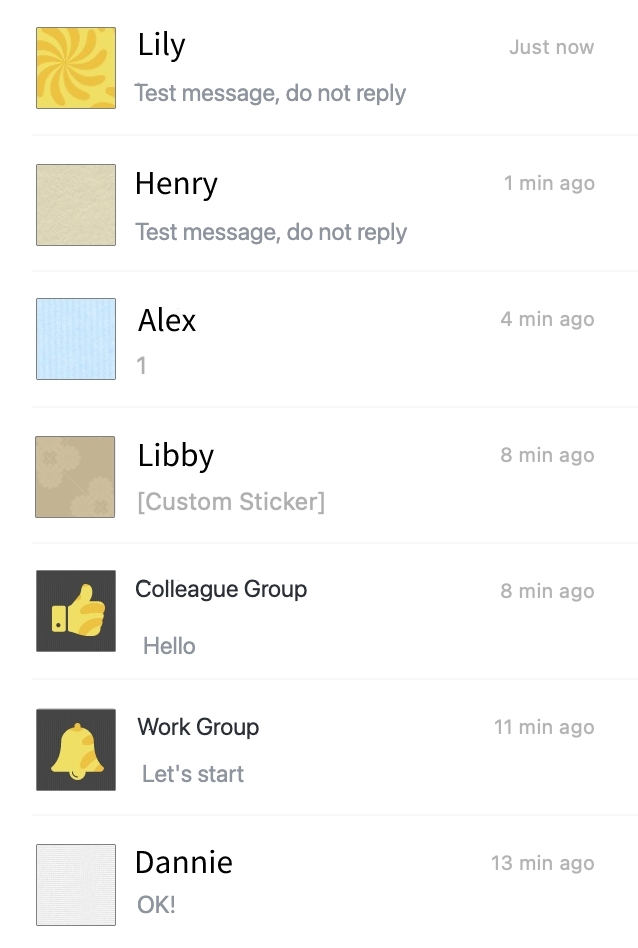Get the conversation list
Overview
Conversation, typically is the logical relationship automatically established by the ZIM SDK when a user sends a "single chat/group" message. Only the following message types can be used to establish a conversation:
| Message Type | Conversation Types |
|---|---|
| Text Messages |
|
| Rich Media Messages(Including image, audio, video, file) | |
| Combined Messages | |
| Custom Messages | |
| Tip Messages | You need to contact ZEGOCLOUD technical support to enable the group management type of Tip message feature. Afterwards, when a user creates a group, the ZIM SDK will convert this operation into a special type of message (Tip message) within the group conversation, resulting in the successful creation of the group conversation. |
ZIM supports users to listen for conversation changes and get a conversation list from the local database. It also supports developers to retrieve the complete conversation list of a specific user from the ZIM server.
You can obtain and display the one-on-one and group chat conversation lists in scenarios such as chats, gaming communities, and online consulting.

Listen for conversation changes
Before logging in, users should call the setEventHandler method to listen for the callback onConversationChanged, After login, the users will receive notifications of conversation changes when the following events happen:
| Category | Event | Event Value | ZIMConversation Property |
|---|---|---|---|
| Basic Conversation Properties | Conversation name changed. | Updated | conversationName |
| Conversation avatar URL changed. | conversationAvatarUrl | ||
| conversationAlias | ||
| Unread message count changed, including changes caused by the user deleting unread messages? | unreadMessageCount | ||
| Additional Conversation Properties | User sets/cancels a conversation as pinned. | isPinned | |
| User sets notification status for a conversation. | notificationStatus | ||
| User saves a conversation draft. | draft | ||
| The user is mentioned in a conversation. If the user deletes the message that mentions them, they will also receive the event notification. | mentionedInfoList | ||
| Last Message in Conversation Changes | User receives a new message. | lastMessage | |
| User sends a new message. | |||
| The status or the content of the last message changes, or it is deleted by the user. | |||
| Conversation Status Changes | User has a new conversation. | Added | - |
User voluntarily leaves/is kicked out of a group conversation. Note This assumes that the group conversation already exists (i.e., there are messages in the conversation). | Disabled | - | |
Group conversation is dissolved. Note This assumes that the group conversation already exists (i.e., there are messages in the conversation). | |||
| Recipient user does not exist when sending a one-on-one message. | |||
| User sends a message to a group they have not joined. | |||
| In a multi-device login scenario, when a user deletes a conversation on one device, other devices will immediately receive a notification of this conversation event. | Deleted | - |
At this time, you can get the conversation list based on your demands.
Currently, the callback onConversationChanged only supports notification of incremental changes of the conversation list in the local database and the conversation list on the ZIM server.
You need to maintain the array of conversation lists retrieved from the queryConversationList method, and based on current conversation updates, perform property changes, inserts, and sorted displays .
// Set up the event handler
zim.setEventHandler(this);
...
public void onConversationChanged(ZIM zim, ArrayList<ZIMConversationChangeInfo> conversationChangeInfoList) {
super.onConversationChanged(zim, conversationChangeInfoList);
}
Get the conversation list
ZIM supports developers to call SDK interfaces to retrieve the current user's conversation list from the local database. It also supports making requests to the ZIM server to retrieve the complete conversation list of a specific user.
After fetching the conversation list, developers can use it to customize the UI display of the conversation list.
From the local database
- The ZIM SDK currently only supports fetching one-to-one and group conversation lists, and does not support fetching the room conversation list.
- The conversation list is stored in the local database, and when getting the conversation list, relevant data will be retrieved from the local database.
- It is recommended for you to use this feature on the first screen of the conversation page.
After login, if users want to know what conversations they have joined, they can call the queryConversationList method to query the conversation list.
To avoid the problem of pulling too many conversations at the same time, which takes a long time and causes slow loading of the conversation interface, you can customize the number of conversations by setting the ZIMConversationQueryConfig object for paging query when pulling conversations.
ZIMConversationQueryConfig config = new ZIMConversationQueryConfig();
// conversation query anchor. Empty indicates that the query starts from the latest.
config.nextConversation = null;
// The number of queries per page.
config.count = 20;
// Get the conversation list.
zim.queryConversationList(config, new ZIMConversationListQueriedCallback() {
@Override
public void onConversationListQueried(ArrayList<ZIMConversation> conversationList, ZIMError errorInfo) {
// Get the results of query the conversation list.
if(errorInfo.code == ZIMErrorCode.SUCCESS) {
// You will need to save and maintain the conversation objects in the array.
} else {
// ......
}
}
});
From the ZIM server
You can get a user's conversation list by calling the server API. For more details, please refer to the server API documentation Query conversation list

